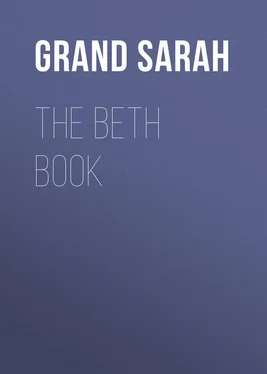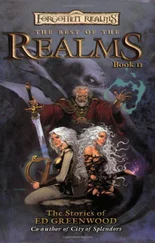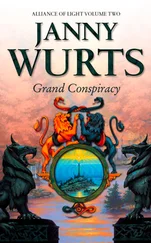Sarah Grand - The Beth Book
Здесь есть возможность читать онлайн «Sarah Grand - The Beth Book» — ознакомительный отрывок электронной книги совершенно бесплатно, а после прочтения отрывка купить полную версию. В некоторых случаях можно слушать аудио, скачать через торрент в формате fb2 и присутствует краткое содержание. Жанр: literature_19, foreign_antique, foreign_prose, Биографии и Мемуары, на английском языке. Описание произведения, (предисловие) а так же отзывы посетителей доступны на портале библиотеки ЛибКат.
- Название:The Beth Book
- Автор:
- Жанр:
- Год:неизвестен
- ISBN:нет данных
- Рейтинг книги:4 / 5. Голосов: 1
-
Избранное:Добавить в избранное
- Отзывы:
-
Ваша оценка:
- 80
- 1
- 2
- 3
- 4
- 5
The Beth Book: краткое содержание, описание и аннотация
Предлагаем к чтению аннотацию, описание, краткое содержание или предисловие (зависит от того, что написал сам автор книги «The Beth Book»). Если вы не нашли необходимую информацию о книге — напишите в комментариях, мы постараемся отыскать её.
The Beth Book — читать онлайн ознакомительный отрывок
Ниже представлен текст книги, разбитый по страницам. Система сохранения места последней прочитанной страницы, позволяет с удобством читать онлайн бесплатно книгу «The Beth Book», без необходимости каждый раз заново искать на чём Вы остановились. Поставьте закладку, и сможете в любой момент перейти на страницу, на которой закончили чтение.
Интервал:
Закладка:
Beth, with big dilated eyes and wet cheeks, saw him do both, and was oppressed to tears no more that day by delight and wonder of the beautiful; but she was always liable to these paroxysms, the outcome of an intensity of pleasure which was positive pain. So, from the first, she was keenly susceptible to outdoor influences, and it was now that her memory was stored with impressions which were afterwards of inestimable value to her, for she never lived amongst the same kind of scenery again.
The children had the run of some gentleman's grounds, which they called The Walks. There were banks of flowers, and sidewalks where the London pride grew, and water, and great trees with hollows in them where the water lodged. Beth called these fairy wells, and put her fingers in to see how deep they were, and there were dead leaves in them; and there, on a memorable occasion, she found her first skeleton leaf, and told Jane Nettles she really didn't know before that there were such things. Once there was a wasp's nest hanging from a branch, and they met a young man coming away from it, holding a handkerchief to his face. He stopped to tell Jane Nettles how he had been stung, and the children wandered off unheeded to look at the nest. It was all grey and gossamer, like cobwebs laid in layers. Beth was an Indian scout inspecting it from behind a neighbouring tree; and then she shelled it with sticks, but did not wait to see it surrender.
They picked up horse-chestnuts from under the trees, in the season, and hammered the green rind off with stones for the joy of seeing the beautiful shining, slippery, dark brown, or piebald, polished fruit within; and also, when there were wet leaves on the ground, they gathered walnuts from out of the long tangled grass, and stained their fingers picking off the covering, which was mealy-green when it burst, and smelt nice; but the nut itself, when they came to it, was always surprisingly small. There were horrid mahogany-coloured pieces of liver put about the walks on sticks sometimes. Jane Nettles said they were to poison the dogs because they came in and destroyed the flowers. Beth wondered how it was people could eat liver if it poisoned dogs, and was careful afterwards not to touch it herself. Most children would have worried the reason out of their nurse, but Jane Nettles was not amiable, and Beth could never bring herself to ask a question of any one who was likely either to snub her for asking, or to jeer at her for not knowing. There are unsympathetic people who have a way of making children feel ashamed of their ignorance, and rather than be laughed at, a sensitive child will pretend to know. Beth was extraordinarily sensitive in this respect, and so it happened that, in later life, she sometimes found herself in ignorance of things which less remarkable people had learnt in their infancy for the asking.
These were certainly days of delight to Beth, but the charm of them was due less to people than to things – to some sight or scent of nature, the smell of new-mown hay from a waggon they had stood aside to let pass in a narrow lane, a glimpse of a high bank on the other side of the road – a high grassy bank, covered and crowned with trees, chiefly chestnuts, on which the sun shone; hawthorn hedgerows from which they used to pick the green buds children call bread-and-butter, and eat them; and one privet-hedge in their own garden, an impenetrable hedge, on the other side of which, as Beth imagined, all kinds of wonderful things took place. The flowers of those early days were crocuses, snowdrops, white roses, a little yellow flower they called ladies' fingers, sea-pinks, and London pride – particularly London pride. In the walks Jane Nettles used to teach her the wonderful rhyme of —
"London Bridge is broken down,
Grand, said the little Dee,
London Bridge is broken down,
Fair-Lade-ee."
And so the rhyme, London pride amongst the rock-work, the ornamental water, a rustic bridge, shining laurel leaves, mahogany-coloured liver, warmth, light, and sweet airs all became mingled in one gracious memory.
People, however, as has been already shown, also came into her consciousness, but with less certainty of pleasing, wherefore she remembered them less, for it was always her habit to banish a disagreeable thought if she could. One day she went into the garden with her spade and an old tin biscuit-box. She put the box on the ground beside her, with the lid off, and began to dig. By-and-by the kitten came crooning and sidling up to her, and hopped into the box. Beth instantly put on the lid, and the kitten was a corpse which must be buried. She hurriedly dug its grave, put in the box, and covered it up with earth. Just as she had finished, a gruff voice exclaimed: "What are ye doing there, ye little divil?" and there was old Krangle the gardener, looking at her over the hedge. "Dig it up again directly," he said, and Beth, much startled, dug it up quicker than she had buried it. The kitten had been but loosely covered, and was not much the worse, but had got some earth in its eye, which was very sore afterwards. People wondered what had hurt it, and Beth looked from one to the other and listened with grave attention to their various suppositions on the subject. She said nothing, however, and Krangle also held his peace, which led to a very good understanding between them. Krangle had a cancer on his lip, and Beth was forbidden to kiss him for fear of catching it. He had a garden of his own too, and a pig, and little boiled potatoes in his cottage. The doctor's brother died of cancer, and Beth supposed he had been naughty and kissed old Krangle, though she wondered he cared to, as Krangle had a very prickly chin. The doctor often came to see papa. He used to talk about the Bible, and then the children were sent out of the room. Once Beth hid under the table to hear what he said. It was all about God, whom it appeared that he did not like. He had a knob at the end of his nose, and Beth laughed at it, in punishment of which, as she used to believe, her own nose developed a little knob at the end. Her mind was very much exercised about the doctor and his household. He and his brother and sister used to live together, but now he lived alone, and on a bed in one of the rooms, according to Jane Nettles, there were furs, and lovely silks, satins, and laces, all being eaten by moths and destroyed because there was no one to look after them. It seemed such a pity, but whose were they? Where was the lady?
Bridget used to come up to the nursery when the children were in bed, to talk to Jane Nettles, and look out of the window. Those gossips in the nursery were a great source of disturbance to Beth when she ought to have been composing herself to sleep. She recollected nothing of the conversations more corrupting than that ghastly account of how the girl was exhumed, so it is likely that the servants exercised some discretion when they dropped their voices to a whisper, as they often did; but these whispered colloquies made her restless and cross, and brought down upon her a smart order to go to sleep, to which she used to answer defiantly, "I will if you'll ask me a riddle." One of the riddles was: "Between two sticks, between two stones, between two old men's shin-bones. What's that?" The answer had something to do with a graveyard, but Beth could not remember what.
She used to suffer a small martyrdom in her little crib on those evenings from what she called "snuff up her nose," a hot, dry, burning sensation which must have been caused by a stuffy room, and the feverish state she tossed herself into when she was kept awake after her regular hour for sleep. Sometimes she sat up in bed suddenly, and cried aloud. Then Jane Nettles would push her down again on her pillow roughly, and threaten to call mamma if she wasn't good directly. Occasionally mamma heard her, and came up of her own accord, and shook her by the shoulder, and scolded her. Then Beth would lie still sobbing silently, and wretched as only a lonely, uncomprehended, and uncomplaining child can be. No one had the faintest conception of what she suffered. Her naughtinesses were remembered against her, but her latent tenderness was never suspected. Once the old Doctor said: "That's a peculiarly sensitive, high-strung, nervous child; you must be gentle with her," and both parents had stared at him. They were matter-of-fact creatures themselves, comparatively speaking, with a notion that such nonsense as nervousness should be shaken out of a child.
Читать дальшеИнтервал:
Закладка:
Похожие книги на «The Beth Book»
Представляем Вашему вниманию похожие книги на «The Beth Book» списком для выбора. Мы отобрали схожую по названию и смыслу литературу в надежде предоставить читателям больше вариантов отыскать новые, интересные, ещё непрочитанные произведения.
Обсуждение, отзывы о книге «The Beth Book» и просто собственные мнения читателей. Оставьте ваши комментарии, напишите, что Вы думаете о произведении, его смысле или главных героях. Укажите что конкретно понравилось, а что нет, и почему Вы так считаете.












